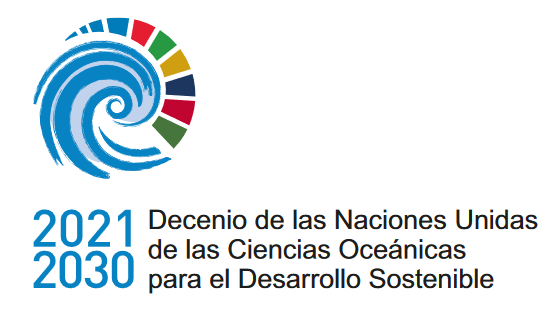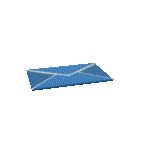Caracterización de patrones morfológicos, químicos y de crecimiento en conchas de especies de Phorcus a lo largo de las costas nororientales de Túnez
DOI:
https://doi.org/10.47193/mafis.3742024010702Palabras clave:
Costa rocosa, contaminación de la concha, morfometría, crecimiento relativoResumen
Este trabajo es una caracterización de la morfometría, el crecimiento relativo y el grado de contaminación metálica de las conchas de dos especies pertenecientes al Género Phorcus a lo largo de las costas rocosas del noreste de Túnez. Los gasterópodos fueron muestreados en nueve ubicaciones durante el invierno de 2017. Nuestros hallazgos sugirieron una variabilidad morfométrica espacial probablemente relacionada con la extensión de la plataforma continental, la geomorfología de las costas, la dinámica de las masas de agua, la depredación y los efectos de la competencia. Además, la investigación de la concha permitió estudiar el patrón de crecimiento e indicó que el desarrollo del tamaño de la concha fue más rápido que el aumento de peso. Además, el uso de conchas de Phorcus como bioindicadores de contaminación por metales a largo plazo, parece ser de creciente interés debido a su abundancia, alta longevidad, fácil muestreo y características ecobiológicas, tanto desde una perspectiva científica como de gestión ecosistémica, que apunta al establecimiento de medidas de conservación dirigidas a entornos marinos costeros.
Descargas
Referencias
Addadi L, Joester D, Nudelman F, Weiner S. 2006. Mollusk shell formation: a source of new concepts for understanding biomineralization processes. Chem Eur J. 12 (4): 980-987.
Affenzeller S, Haar N, Steiner G. 2017. Revision of the genus complex Gibbula: an integrative approach to delineating the Eastern Mediterranean genera Gibbula Risso, 1826, Steromphala Gray, 1847, and Phorcus Risso, 1826 using DNA-barcoding and geometric morphometrics (Vetigastropoda, Trochoidea). Org Divers Evol. 17: 789-812.
Béranger K, Mortier L, Gasparini G. P, Gervasio L, Astraldi M, Crépon M. 2004. The dynamics of the Sicily Strait: a comprehensive study from observations and models. Deep Sea Res Part II Top Stud Oceanogr. 51 (4-5): 411-440.
Boucetta SK. 2017. Biosurveillance des eaux du littoral Est Algérien. Á travers un mollusque gastéropode: Phorcus(=Osilinus) turbinatus (Born, 1780) [PhD thesis]. Annaba: Département des Sciences de la Mer, Faculté des Sciences, Université Badji Mokhtar.
Boucetta S, Derbal F, Boutiba Z, Kara MH. 2010. First Biological Data on the marine snails Monodonta turbinata (Gastropoda, Trochidae) of Eastern coasts of Algeria. Global change: mankind-marine environment interactions. Proceeding of the 13th French-Japanese Oceanography Symposium. 57: 1-5.
Boulajfene W, Boukhicha J, Deidun A, Berto D, Romeo T, Ben Hassine OK, Tlig-Zouari S. 2015. Biomonitoring of the environmental contamination by organotins in the Gulf of Tunis: occurrence of imposex in Stramonita haemastoma (Linnaeus, 1767). Mar Freshwat Res. 66 (9): 778-785.
Boulajfene W, Lasram M, Zouari-Tlig S. 2021. Integrated biomarker response for environmental assessment using the gastropod Phorcus turbinatus along the Northern and the Northeastern coasts of Tunisia. Life. 11 (6): 529.
Boulajfene W, Strogyloudi E, Catsiki VA, El Mlayah A, Tlig-Zouari S. 2017. Bio-monitoring of metal impact on metallothioneins levels in the gastropod Phorcus turbinatus (Born, 1778) in the northeastern and the eastern coasts of Tunisia. Mar Pollut Bull. 120 (1-2): 274-285.
Boulajfene W, Strogyloudi E, Lasram M, El Mlayah A, Vassiliki-Angelique C, Zouari-Tlig S. 2019. Biological and biochemical assessment in Phorcus articulatus (Lamarck 1822): contamination and seasonal effect. Environ Monit Assess. 191: 1-16.
Boulajfene W, Tlig-Zouari S. 2016. Shell morphological comparison of two species of Phorcus genus (Risso, 1826) along the rocky coasts of Tunisia. Cah Biol Mar. 57 (3): 261-270.
Cabral JPS. 2020. Morphological Variability of Phorcus lineatus (da Costa, 1778) Shells along the coast of Portugal and the significance of the environment on shell morphology. Thalassas. 36 (1): 9-22.
Clark MS, Peck LS, Arivalagan J, Backeljau T, Berland S, Cardoso JC, Harper EM. 2020. Deciphering mollusc shell production: the roles of genetic mechanisms through to ecology, aquaculture and biomimetics. Biol Rev. 95 (6): 1812-1837.
Crothers J. 2012. Snails on rocky sea shores. Vol. 30. Pelagic Publishing. 97 p.
De Noia M, Telesca L, Vendrami DL, Gokalp HK, Charrier G, Harper EM, Hoffman JI. 2020. Population genetic structure is unrelated to shell shape, thickness and organic content in European populations of the soft-shell clam Mya arenaria. Genes. 11 (3): 298.
Du Y, Lian F, Zhu L. 2011. Biosorption of divalent Pb, Cd and Zn on aragonite and calcite mollusk shells. Environ Pollut. 159 (7): 1763-1768.
Faidallah AA, Ali RA, Ali SM. 2021. Morphology of Phorcus turbinatus (Gastropoda) in the eastern Libyan Mediterranean Sea. Int Res J Nat Sci. 9 (1): 12-34.
García-Escárzaga A, Gutiérrez-Zugasti I, Cobo A, Cuenca-Solana D, Martín-Chivelet J, Roberts P, González-Morales MR. 2019. Stable oxygen isotope analysis of Phorcus lineatus (da Costa, 1778) as a proxy for foraging seasonality during the Mesolithic in northern Iberia. Archaeol Anthropol Sci. 11: 5631-5644.
Garcia-Sánchez A, Alvarez-Ayuso E. 2002. Sorption of Zn, Cd and Cr on calcite. Application to purification of industrial wastewaters. Miner Eng. 15 (7): 539-547.
Gawad SSA. 2018. Concentrations of heavy metals in water, sediment and mollusk gastropod, Lanistes carinatus from Lake Manzala, Egypt. Egypt J Aquat Res. 44 (2): 77-82.
Godelitsas A, Astilleros JM, Hallam K, Harissopoulos S, Putnis A. 2003. Interaction of calcium carbonates with lead in aqueous solutions. Environ Sci Technol. 37 (15): 3351-3360.
Halanych KM. 2004. The new view of animal phylogeny. Annu Rev Ecol Evol Syst. 35: 229-256.
Harley CD, Denny MW, Mach KJ, Miller L. P. 2009. Thermal stress and morphological adaptations in limpets. Funct Ecol. 23: 292-301.
Hillesheim MB, Hodell DA, Leyden BW, Brenner M, Curtis JH, Anselmetti FS, Schnurrenberger DW. 2005. Climate change in lowland Central America during the late deglacial and early Holocene. Published for the Quaternary Research Association. J Quat Sci. 20 (4): 363-376.
Huxley JS. 1924. Constant differential growth-ratios and their significance. Nature. 114 (2877): 895-896.
Jørgensen A. 2002. Morphological variation in Lacuna parva (Gastropoda: Littorinidae) from different European populations. Helgol Mar Res. 56: 149-158.
Jordaens K, De Wolf H, Vandecasteele B, Blust R, Backeljau T. 2006. Associations between shell strength, shell morphology and heavy metals in the land snail Cepaea nemoralis (Gastropoda, Helicidae). Sci Total Environ. 363 (1-3): 285-293.
Lau S, Mohamed M, Yen ATC, Su’ut S. 1998. Accumulation of heavy metals in freshwater molluscs. Sci Total Environ. 214 (1-3): 113-121.
Leppänen JJ, Saarinen T, Jilbert T, Oulasvirta P. 2021. The analysis of freshwater pearl mussel shells using µ-XRF (micro-x-ray fluorescence) and the applicability for environmental reconstruction. SN Appl Sci. 3: 1-8.
Liu Y, Sun C, Xu J, Li Y. 2009. The use of raw and acid-pretreated bivalve mollusk shells to remove metals from aqueous solutions. J Hazard Mater. 168 (1): 156-162.
Loftus E, Rogers K, Lee‐Thorp J. 2015. A simple method to establish calcite: aragonite ratios in archaeological mollusk shells. J Quat Sci. 30 (8): 731-735.
Mandal BK, Suzuki KT. 2002. Arsenic round the world: a review. Talanta. 58 (1): 201-235.
Mannino MA, Thomas KD, Leng MJ, Sloane HJ. 2008. Shell growth and oxygen isotopes in the topshell Osilinus turbinatus: resolving past inshore sea surface temperatures. Geo-Mar Lett. 28: 309-325.
Marcoen JM, Naud J, Brohée JC, Crélot I, Delcarte E, Agneesens R. 2000. Le fond géopédochimique des sols: potentialité de l’analyse chimique élémentaire globale par spectrométrie de fluorescence X (XRF). Séminaire Intensification agricole et qualité des sols et des eaux. Rabat. p. 75-94.
Michalek K. 2019. Scottish mussel culture in the natural environment: observations and implications for industry [PhD thesis]. Aberdeen: University of Aberdeen.
Moreira R, Novoa B, Figueras Huerta A. 2019. Cellular aspects of innate immunity in molluscs. Reference module in life sciences. Elsevier. DOI: https://doi.org/10.1016/B978-0-12-809633-8.90283-8
Taiyi J, Nordberg M, Frech W, Dumont X, Bernard A, Ye T-t, Kong Q, Wang Z, Li P, Lundström N-G, et al. 2002. Cadmium biomonitoring and renal dysfunction among a population environmentally exposed to cadmium from smelting in China (ChinaCad). Biometals. 15: 397-410.
Parker WG, Yanes Y, Surge D, Mesa-Hernández E. 2017. Calibration of the oxygen isotope ratios of the gastropods Patella candei crenata and Phorcus atratus as high-resolution paleothermometers from the subtropical eastern Atlantic Ocean. Palaeogeogr Palaeoclimatol Palaeoecol. 487: 251-259.
Prendergast AL, Azzopardi M, O’connell TC, Hunt C, Barker G, Stevens RE. 2013. Oxygen isotopes from Phorcus (Osilinus) turbinatus shells as a proxy for sea surface temperature in the central Mediterranean: a case study from Malta. Chem Geol. 345: 77-86.
Reist JD. 1985. An empirical evaluation of several univariate methods that adjust for size variation in morphometric data. Can J Zool. 63 (6): 1429-1439.
Rosenberg G. 2014. A new critical estimate of named species-level diversity of the recent Mollusca. Am Malacol Bull. 32 (2): 308-322.
Sharma SK, Goloubinoff P, Christen P. 2008. Heavy metal ions are potent inhibitors of protein folding. Biochem Biophys Res Commun. 372 (2): 341-345.
Sorgente R, Olita A, Oddo P, Fazioli L, Ribotti A. 2011. Numerical simulation and decomposition of kinetic energy in the Central Mediterranean: insight on mesoscale circulation and energy conversion. Ocean Sci. 7 (4): 503-519.
Sousa R, Delgado J, González JA, Freitas M, Henriques P. 2018. Marine snails of the genus Phorcus: biology and ecology of sentinel species for human impacts on the rocky shores. Biol Resour Water. DOI: http://doi.org/10.5772/intechopen.71614
Sousa RJS. 2020. Key exploited species as surrogates for coastal conservation in an oceanic archipelago: insights from topshells and limpets from Madeira (NE Atlantic Ocean) [PhD thesis]. Madeira: Universidade da Madeira.
Stewart BD, Jenkins SR, Boig C, Sinfield C, Kennington K, Brand AR, Kröger R. 2021. Metal pollution as a potential threat to shell strength and survival in marine bivalves. Sci Total Environ. 755 (1): 143019.
Templado J, Rolán E. 2012. A new species of Phorcus (Vetigastropoda, Trochidae) from the Cape Verde Islands. Iberus. 30 (2): 89-96.
Thioulouse J, Dray S. 2007. Interactive multivariate data analysis in R with the ade4 and ade4TkGUI packages. J Stat Softw. 22: 1-14.
Tlig-Zouari S, Rabaoui L, Fguiri H, Diawara M, Ben Hassine O. K. 2010. Spatial diversity of rocky midlittoral macro-invertebrates associated with the endangered species Patella ferruginea (Mollusca: Gastropoda) of Tunisian coastline. Estuar Coast Shelf Sci. 87 (2): 275-283.
Trevisan R, Flesch S, Mattos JJ, Milani MR, Bainy ACD, Dafre AL. 2014. Zinc causes acute impairment of glutathione metabolism followed by coordinated antioxidant defenses amplification in gills of brown mussels Perna perna. Comp Biochem Physiol C Toxicol Pharmacol. 159: 22-30.
Vasconcelos P, Santos AC, Pereira F, Moura P, Carvalho AN, Gaspar MB. 2022. Shell morphology, morphometric relationships and relative growth of three topshell species (Gastropoda: Trochidae) from the Algarve coast (southern Portugal). Thalassas. 38 (1): 665-674.
Wang N, Ye Z, Huang L, Zhang C, Guo Y, Zhang W. 2022. Arsenic occurrence and cycling in the aquatic environment: a comparison between freshwater and seawater. Water. 15 (1): 147.
[WHO] World Health Organization. 2004. Manganese and its compounds: environmental aspects. Concise International Chemical Assessment Document 63. International Program on Chemical Safety. Geneva: WHO.
Yap CK, Ismail A, Tan SG, Rahim IA. 2003. Can the shell of the green-lipped mussel Perna viridis from the west coast of Peninsular Malaysia be a potential biomonitoring material for Cd, Pb and Zn? Estuar Coast Shelf Sci. 57 (4): 623-630.

Descargas
Publicado
Número
Sección
Licencia
Derechos de autor 2024 Wafa Boulajfene, Vassiliki-Angelique Catsiki, Sabiha Tlig-Zouari

Esta obra está bajo una licencia internacional Creative Commons Atribución-NoComercial-CompartirIgual 4.0.
Los autores de los artículos publicados en Marine and Fishery Sciences conservan los derechos de autor de sus artículos, a excepción de las imágenes de terceros y otros materiales añadidos por Marine and Fishery Sciences, que están sujetos a los derechos de autor de sus respectivos propietarios. Por lo tanto, los autores son libres de difundir y volver a publicar sus artículos, sujeto a los requisitos de los propietarios de derechos de autor de terceros y sujeto a que la publicación original sea completamente citada. Los visitantes también pueden descargar y reenviar artículos sujetos a los requisitos de citas. La capacidad de copiar, descargar, reenviar o distribuir cualquier material siempre está sujeta a los avisos de derechos de autor que se muestran. Los avisos de copyright deben mostrarse de manera prominente y no pueden borrarse, eliminarse u ocultarse, total o parcialmente. El autoalmacenamiento en servidores y repositorios de preimpresión está permitido para todas las versiones.
Esta revista ofrece a los autores una política de acceso abierto. Los usuarios pueden leer, descargar, copiar, distribuir, imprimir, buscar o vincular los textos completos de los artículos, o usarlos para cualquier otro propósito legal dentro de la licencia Creative Commons 4.0 (BY-NC-SA), sin solicitar permiso previo del editor o del autor. Esto está de acuerdo con la definición BOAI de acceso abierto.






















